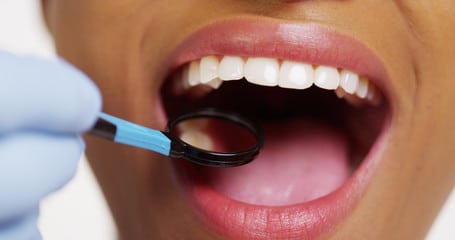|
|
By Sharon Lewis
Usually, when you think about your health, you think in terms of who you would call if you had a problem. For instance, if your mouth hurts, you would call a dentist. If the rest of your body hurts, you would call a medical doctor. Based on that thinking, they are separate, and neither impacts the other. But you’d be wrong. Your oral/dental health can significantly impact your overall health. You must include the health of your mouth when you think of general health and well-being. So more than a yearly visit to the doctor is needed to ensure a good health outcome. To be medically sound, you must also include a twice-yearly visit to a dentist.
The mouth is the perfect breeding ground for bacteria. It is wet, dark, and warm. The foods and drinks we consume feed the bacteria, making it easy for harmful bacteria to build up around the teeth and gums. This puts you at risk for developing periodontal (or gum) disease, an infection, and inflammation of the gums and bones surrounding your teeth.
A growing body of research has found that periodontal disease can initiate or complicate a range of health conditions, including diabetes, heart disease, respiratory infections, infertility, pregnancy complications, osteoporosis, rheumatoid arthritis, and dementia.
According to the Centers for Disease Control and Prevention (CDC), roughly 47% of people 30 years of age and older have some form of periodontal disease. The early stage of this condition is called gingivitis. Gingivitis is when the gums become swollen, red, or tender and may bleed easily. Left untreated, gingivitis progresses to periodontitis, where the gums recede, bone can be lost, and teeth can loosen and fall out. Once periodontitis develops, bacteria and their toxic byproducts can move from the surfaces of the mouth into the bloodstream and potentially damage other organs.
Diabetes
Gum disease makes it more likely that you will develop diabetes because gum disease causes inflammation. That inflammation causes higher than average glucose (sugar) levels, making it much more likely for a person to be diagnosed as pre-diabetic and or to develop diabetes. If you are already diabetic, there is an increased risk of gum disease. So, people who are diabetic need to get good oral care and manage their blood sugar.
Heart Disease and Stroke
The bacteria in dental plaque can affect your heart and lungs. One potentially fatal disease is called bacterial endocarditis, where the lining of the heart and heart valves enlarge. Excess dental plaque is linked to chronic obstructive pulmonary disease (COPD). Research by the American Academy of Periodontology shows that people with gum disease are twice as likely to suffer from heart disease. In another study done by Boston University’s Henry M. Goldman School of Dental Medicine, it was found that people with missing teeth due to gum disease were at an increased risk of having a stroke.
Respiratory Infections
The bacteria associated with gingivitis that becomes prolonged can be breathed into the lungs, causing respiratory illnesses such as pneumonia. Once bacteria enter the bloodstream and lung tissues, the associated inflammation can worsen pre-existing conditions such as asthma and COPD.
Pregnancy Complications and Infertility
Pregnant women may be more prone to oral infections such as cavities and gum disease. So good oral hygiene is a must. Several studies link severe periodontal disease with preterm, low-birth-weight babies. Pregnant women with periodontal disease may be seven times more likely to have premature babies. Low birth weight babies are more prone to respiratory problems, anemia, jaundice, mental retardation, cerebral palsy, congestive heart failure, and malnutrition. The link between poor oral health and preterm labor is likely the labor-inducing chemical found in oral bacteria called prostaglandins. Women with periodontal disease have very high levels of prostaglandins in their blood.
In a 2019 study, researchers found that treating periodontal disease in pregnant women improved birth weight and reduced the risk of preterm birth and the death of the fetus and newborn. Lastly, there is research that bacteria from the mouth may activate immune cells that circulate in the blood, causing inflammation in the womb. That inflammation could distress the placenta and fetal tissues. Women are not only at higher risk during pregnancy for oral health problems but during other times of increased hormone levels, such as during puberty, menstrual cycles, and menopause. Women may also be more prone to plaque and bacteria.
There is also research that suggests that chronic periodontitis could make it more difficult for people to conceive. Poor dental hygiene does not make it impossible for people to conceive, bit it may take longer than a person with good dental hygiene.
Osteoporosis
There is a direct correlation between bone health and oral health. Osteoporosis is a disease that weakens bones and increases the risk of fractures. Mainly of the hip, spine, and wrist. As the bones weaken and deteriorate, the jaw can also be affected, causing the teeth to no longer have a firm foundation. The oral bacteria surrounding the teeth can weaken a person’s defenses against the bacteria that affect the gums and can lead to periodontal disease.
Dementia
Researchers are interested in the link between oral health and dementia, and Alzheimer’s disease in
particular. According to a recent article in The New York Times, Dr. Frank Scannapieco, a professor of oral biology at the University of Buffalo School of Dentistry, is quoted as saying that “Bacteria that is found in the mouth have been identified in the brain tissue of patients with Alzheimer’s, which implies a potential role for them in the disease. It is believed that oral bacteria related to periodontal disease could affect the brain directly by “infecting the central nervous system” or producing “chronic systemic inflammation that reaches the brain.” However, there is no evidence that oral bacteria causes Alzheimer’s. It is just one risk factor for the disease.
Bacteria that cause periodontal disease are detected in other conditions, such as rheumatoid arthritis and kidney and liver disease. Emerging research also links oral bacteria to colorectal and breast cancer. More research will be required to confirm the links.
 Preventive Dental Care is Important
Preventive Dental Care is Important
Your mouth can tell you a lot about your overall health. The National Institutes of Health (NIH) state that “more than 90% of all common diseases have oral symptoms.” One example: mucosal lesions or sores are common in people with HIV/AIDS. Consistent preventive care may help with the early detection and treatment of HIV/AIDS and many other conditions.
To protect your oral health, practice good hygiene daily by:
• Brushing your teeth two times per day for two minutes each time.
• Using a soft bristle brush.
• Flossing daily.
• Using mouthwash to flush out food particles left after brushing and flossing.
• Eating a healthy diet.
• Limiting sugary foods and drinks.
• Replacing your toothbrush if the bristles are splayed or worn.
• Scheduling regular dental checkups.
• Avoid tobacco use.
Good oral hygiene is a choice that you can make daily to ensure your overall health for years to come.







